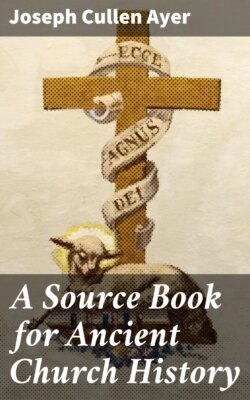Читать книгу A Source Book for Ancient Church History - Joseph Cullen Ayer - Страница 84
На сайте Литреса книга снята с продажи.
(a) Acta Archelai, 55. (MSG, 10:1526.)
ОглавлениеThe Acta Archelai purport to be an account of a disputation held in the reign of the Emperor Probus (276–282) by Archelaus, Bishop of Kaskar in Mesopotamia, with Mani, the founder of Manichæanism. [pg 083] The work is of uncertain authorship; it belongs to the first part of the fourth century. It is the most important source for the Manichæan doctrine (v. infra, § 54). It exists only in a Latin translation probably from a Greek original.
Among the Persians there was also a certain preacher, one Basilides, of more ancient date, not long after the time of our Apostles. Since he was of a shrewd disposition himself, and observed that at that time all other subjects were preoccupied, he determined to affirm that dualism which was maintained also by Scythianus. And so, since he had nothing to advance which he might call his own, he brought the sayings of others before his adversaries. And all his books contain some matters difficult and extremely harsh. The thirteenth book of his Tractates,39 however, is still extant, which begins thus: “In writing the thirteenth book of our Tractates, the word of salvation furnished us with the necessary and fruitful word. It illustrates40 under the figure of a rich [principle] and a poor [principle], a nature without root and without place and only supervenes upon things.41 This is the only topic which the book contains.” Does it not, then, contain a strange word, as also certain persons think? Will ye not all be offended with the book itself, of which this is the beginning? But Basilides, returning to the subject, some five hundred lines intervening, more or less, says: “Give up this vain and curious variation, and let us rather find out what inquiries the Barbarians [i.e., the Persians] have instituted concerning good and evil, and to what opinions they have come on all these subjects. For certain among them have said that there are for all things two beginnings [or principles], to which they have referred good and evil, holding these principles are without beginning and ingenerate; that is to say, that in the origins of things there were light and darkness, which existed of themselves, and which were not declared to exist.42 When these subsisted [pg 084] by themselves, they each led its own proper mode of life as it willed to lead, and such as was competent to it. For in the case of all things, what is proper to it is in amity with it, and nothing seems evil to itself. But after they came to the knowledge of each other, and after the darkness contemplated the light, then, as if fired with a passion for something superior, the darkness rushed to have intercourse with the light.”
